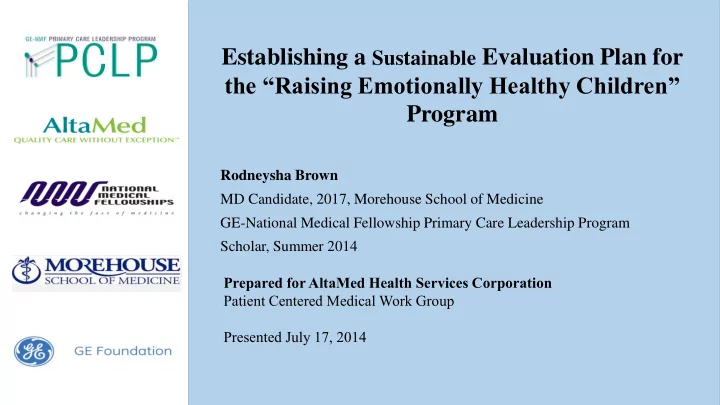

Establishing a Sustainable Evaluation Plan for the “Raising Emotionally Healthy Children” Program Rodneysha Brown MD Candidate, 2017, Morehouse School of Medicine GE-National Medical Fellowship Primary Care Leadership Program Scholar, Summer 2014 Prepared for AltaMed Health Services Corporation Patient Centered Medical Work Group Presented July 17, 2014
Introduction Boyle Heights Community AltaMed Boyle Heights Clinic • Densely populated urban community east of • The largest federally qualified health center (FQHC) in downtown Los Angeles this community • One of the largest Latino and Mexican American • Patient population of ~14,000 populations in U.S. • Striving to provide quality care without exception the • Low income working community clinic serves a largely underserved and uninsured population • Historically lagged behind other communities in education, healthcare, economic well-being, and public safety • Community based organizations have begun interventions to eliminate social issues within community
Background Importance of Evaluating the Identifying the Need for a Parenting Program Intervention • Former AltaMed Boyle Heights pediatrician Dr. • There are few studies on parenting intervention in Latino community and/or medical settings Mona Puri • Parents having difficulty controlling and correcting • Evaluation of program is important for its further development and larger-scale implementation to children’s behavior in the waiting and exam rooms the other communities that AltaMed serves • Parenting is especially important in underserved • The current evaluation plan has failed to yield the communities desired data regarding • The quality of parenting that a child receives can changes in parental knowledge and behavior affect their cognitive, social, emotional, and physical development (Sanders 2008). • “Raising Emotionally Healthy Children” program was initiated in November 2012
Methodology The initial evaluation was based on a quasi-experimental design and included: 1. Administration of a demographics survey during the first session 2. Administration of a knowledge pre/posttest during the first and last sessions respectively 3. Administration of a parenting behavioral survey pre-, post-, and 3-months out of the class A post class survey to evaluate the class as a whole 4. All of the test and surveys were available in both English and Spanish A total of 25 surveys were collected from sessions that occurred in May 2013, July 2013, October 2013, December 2013, February 2014, and May 2014. To address the issues with the evaluation of the program, this project involved: 1. Evaluating surveys from previous “Raising Emotionally Healthy Children” parenting classes 2. Analyzing the surveys to understand reasons for participants not entirely completely surveys 3. Suggesting and implementing changes to evaluation plan to ensure its effectiveness and sustainability in the future
Results Demographics of Participants Discipline Age Range How Often Did You Spank Before Languages Spoken 40.00% Coming to This Class? How Often Do You Spank Now? 60.00% 35.00% 100.00% 100.00% 50.00% 30.00% 80.00% 40.00% 25.00% 60.00% 30.00% 20.00% 50.00% 20.00% 40.00% 15.00% 10.00% 20.00% 10.00% 0.00% 0.00% 0.00% 5.00% Spanish Both English Only Never Once a day Once a week Never Once a Once a Several 0.00% Only Spanish and day week times a <20 21-30 31-40 >40 English day Gender Now If My Child Throws a 100.00% Number of Children Trantrum I Ignore Him Before This Class If My Child Threw 100.00% a Tantrum I Ignored Him 35.00% 80.00% 100.00% 30.00% 80.00% 60.00% 80.00% 25.00% 60.00% 20.00% 60.00% 40.00% 15.00% 40.00% 40.00% 10.00% 20.00% 20.00% 20.00% 5.00% 0.00% 0.00% 0.00% No Yes 0.00% 1 2 3 4 5 Male Female No Yes
Results Communication Reinforcing Positive Behaviors How Often Did You Ignore Your Child's How Often Do You Ignore You Questions Before This Class? How Often Did You Use Behavior How Often Do You Use Behavior Child's Questions Now? Charts Before This Class? Charts Now? 100.00% 100.00% 100.00% 100.00% 80.00% 80.00% 80.00% 60.00% 50.00% 60.00% 60.00% 40.00% 40.00% 40.00% 20.00% 20.00% 0.00% 20.00% 0.00% 0.00% Never Sometimes 0.00% Never Sometimes All the time Never Never Once a Several Once a Day Times a Week Preparing for Outings Day I Would Make My Child Believe We I Still Make My Child Believe We Are Were Going Somewhere Other Than Going Somewhere Other Than the the Doctor Before this Class 100.00% Doctor. 100.00% 80.00% 80.00% 60.00% 60.00% 40.00% 40.00% 20.00% 20.00% 0.00% Never 0.00% No Yes
Discussion • Overall change in parental behavior to include more effective methods of parenting in regards to: discipline, communication, reinforcing positive behaviors, and preparing for outings • Surveys were not reviewed for completeness • Evaluation was not being conducted as intended • Only 3 participants completed a knowledge pre- and posttest • Behavior survey was administered as combined pre/posttest • No post class survey
Recommendations • S.M.A.R.T objectives • Specific, measurable goals that are attainable, relevant, and time bound • Respond to concerns/needs expressed by parents • Focus groups • Surveys • Yearly evaluation • Recruitment plan • Digital stories • Younger parents and grandparents
Conclusion Changes were implemented to the address the inconsistencies and missing data found upon evaluation of the surveys collected from previous parenting sessions 1. Questions regarding education level, ethnicity, community, and martial status were added to the demographics survey 2. Separate knowledge pre/posttest was created for each session with questions focused on the objectives of that respective session 3. Participants will complete a knowledge pretest before the beginning of the each session and repeat it at the end of that same session Establishing a reliable evaluation plan and valuable curriculum is essential for further development and larger- scale implementation of the “Raising Emotionally Healthy Children” program to the other communities that AltaMed serves.
Acknowledgements GE-NMF Primary Care Leadership Program Faculty and Staff at AltaMed Health Services, Inc. Dr. Puri Jessica Murio-Garcia Dr. Hochman Dr. Vega Bessie Ramos
Recommend
More recommend